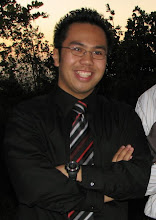 Above: Jeeps at the off-road exhibit at the Chicago Auto Show. Now look at the Jeep on the incline, and paint yourself a picture, putting the car on a small concrete road, surrounded by tropical flora. Now, that describes some of those roads around Ross.
Above: Jeeps at the off-road exhibit at the Chicago Auto Show. Now look at the Jeep on the incline, and paint yourself a picture, putting the car on a small concrete road, surrounded by tropical flora. Now, that describes some of those roads around Ross.IN THE UNITED STATES,
A RAINBOW EXISTS TOO.
I love the nurses at the Jackson Park neonatal ward. They have been very helpful to me and my medical education. I feel very comfortable asking them questions about the patients, and they're always willing to help when my attending doctor is elsewhere. A few days ago, I was heading out the door, and I said "Have a good one!" to both of the nurses at the nurses' desk.
"Hey, Wait!" one of them then shouted.
We then had one of those exchanges solely in body language. I looked at the nurses with one of those What did I do? facial expressions. They both then pointed at my chest... I looked down, and instead of my clipboard, they caught a green binder that was a patient chart, instead of my clipboard. Whoops... that gave me another reason to be appreciative to have the nursing staff around. After a nervous laugh and apology, I walked to return the binder where it belonged.
That, my friends, is my embarrassing medical student mistake #1.
---
A few months ago, I wrote an article about how primitive record keeping in Dominica was. In each record, a multitude of colors for different types of documentation could be found, pink, yellow, and green. But now I face a new dilemma, as colors aren't exactly as helpful in the states as it was in Dominica. I've noticed two issues with paper record systems in America, to my current experience.
1. Forms, Forms, Forms - The one advantage to Dominica's record system was that at least I just needed to keep track of a couple of colors, and I knew what the colors and sheets were going to present to me (although, the standard as to what information needed to be put on the page wasn't exactly the same from doctor/staffer to doctor/staffer). In the American hospitals, there's loads and loads of forms, making it easy for someone who knows what's where to find the info they need, but to a medical student like me, a pain in the butt, when finding out that different hospitals have different standards.
2. Reading the Doctor's handwriting - This is a problem anywhere, but at least in Dominica, only a few doctors and staffers wrote information in each record, so I got to know their handwriting patterns well. However, in America I've noticed that several doctors can contribute to a patient's record, making me feel I'm in a game show where in order to win (the prize: getting the diagnosis), I have to be able to skillfully read paragraphs of information. Well, I guess I'm slowly getting the hang of it - I figured that if I can't read the word, its like trying to figure out the definition to the word I've never heard of before: try to guess out of context. But whenever it's possible, it's always better to ask when the doctor or staffer's available.
As much as during my lifetime, I'll probably get to see electronic record keeping, I can say that I still need to get used to the plethora of forms and handwriting styles known to man. Record keeping is really important in medicine: the ability to communicate and understand communication is important to appropriately manage our patients. This is just another one of those "unwritten skills" that I need to learn during my clerkships.


No comments:
Post a Comment